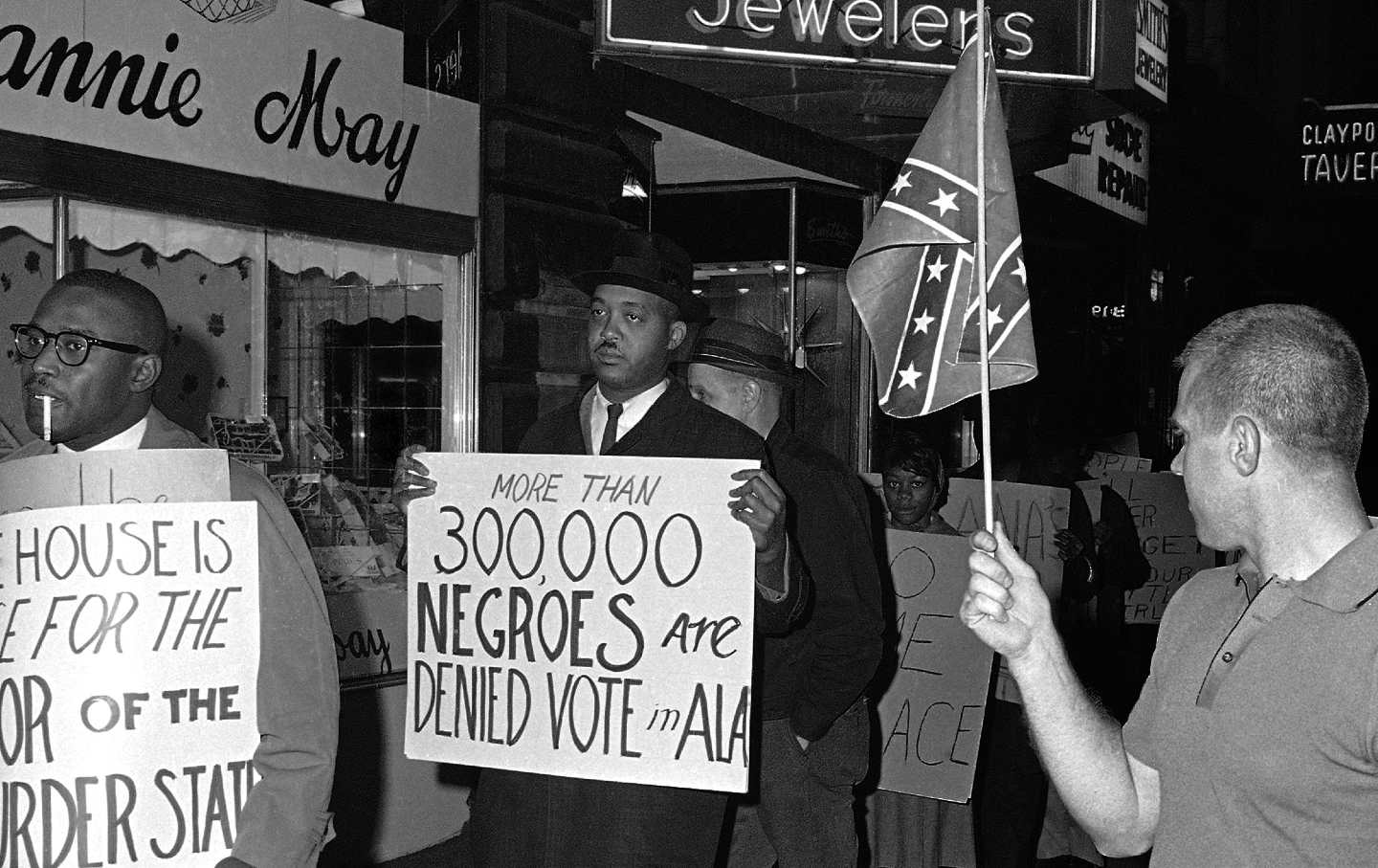May 2, 2025
When the US imprisoned Japanese-Americans during WWII, public solidarity and community defense were how people supported the interned. Their strategies remain relevant today.
The daily reveal of anti-immigrant actions by the US government has been spectacularly shocking. Somehow each new human rights violation, new constitutional infringement, new mistreatment, new indignity, new imaginative cruelty towards immigrants—documented and undocumented—manages to be more gratuitously inhumane than the last.
Even though we all knew it was coming, this has been so much worse than anticipated. Trump promised mass deportations, but as ICE struggles to deliver them, they are grabbing the easiest targets—law-abiding community members. Families are being broken up as longtime undocumented residents are hauled off. Valid visas are being suddenly terminated. Asylum is being curtailed, as if the United States’ obligation to consider asylum claims is optional. Legal options for immigration are being narrowed. Temporary visitors with visas are being detained. ICE agents are acting like carjackers, breaking windows and violently dragging people out of their cars and arresting them. Shockingly, the US illegally sent 238 men to an El Salvador forced labor prison. These men were given no due process and in many cases, clearly did not merit detainment of any sort. And of course, there is the revocation of green cards, a rare act only the secretary of state is authorized to perform. The US government has openly admitted that these are being revoked for pro-Palestinian speech, something many of us understand to be First Amendment–protected activity.
I have been wondering what I can do to alleviate this situation, if anything. What can any of us do in the face of such overwhelming power, violence, and disregard for the law? When the forces pushing for mass deportation and mass dehumanization of 11-to-15 million undocumented people feel so powerful and ubiquitous?
There are many resources and blueprints for action, but so many depend on contacting our congressional representatives or senators, urging them to take action. I can and I will, but I have also long since learned that in the deep-red state of Idaho with its entrenched incumbents (for example, Mike Crapo has held his Senate seat since 1999), they will implement the standard Republican agenda and are unlikely to challenge Trump. Even my state representatives are rather recalcitrant, despite representing a legitimate swing district. No e-mail, no call, no in-person capitol visit will convince them to do anything other than implement the agenda of the Idaho Republican Party, which has a strong anti-immigrant platform. We should keep writing our legislators, because it is their job to listen to us and serve us, but that is not going to be enough. In the same vein, we cannot rely on the court system to save us.
Some of the most egregiously illegal anti-immigrant actions are being justified under the Alien Enemies Act of 1798, one of four bills that “tightened restrictions on foreign-born Americans and limited speech critical of the government” (National Archives). The last time this law was used was during World War II to justify the internment of Japanese immigrants and citizens of Japanese descent living on the West Coast.
After the bombing of Pearl Harbor in Hawaii, Japanese Americans from the West Coast were forced to give up their homes, land, and possessions, settle their affairs, and move with six days’ notice to inland locations chosen for their remoteness and distance from militarily strategic locations. The US formally apologized for internment in 1988 and provided reparations to its victims. How did this internment happen in a supposedly democratic society? What did people do to resist it or help those interned?
It is clear there was a large amount of public support for Japanese internment in the aftermath of the Pearl Harbor attack. After Pearl Harbor, many prominent newspapers published editorials questioning the loyalty of Japanese Americans and supporting their incarceration in the name of national security. For those who recall the propaganda campaign leading up the 2003 Iraq invasion, this may feel familiar.
The memoir of Milton Eisenhower, the director of the War Relocation Authority for its first 90 days, titled The President Is Calling, has been particularly instructive. According to Eisenhower, a man who ultimately opposed internment but oversaw implementing it, there were many forces at work leading to internment. It was not the result of a single person, although some individuals share the blame more than others. In his words:
The evacuation of Japanese-Americans from their homes on the coast to hastily constructed assembly centers and then to inland relocation centers was an inhumane mistake. Thousands of American citizens of Japanese ancestry were stripped of their rights and freedom and treated almost like prisoners of war. Many lost their homes, their businesses, their savings. For 120,000 Japanese the evacuation was a bad dream. How could such a tragedy have occurred in a democratic society that prides itself on individuals’ rights and freedoms? How could responsible leaders make such a fateful decision? I have brooded about this whole episode on and off for the past three decades, for it is illustrative of how an entire society can somehow plunge off course.
Misunderstandings, rumor, fear, misinformation, prejudice, and ignorance were dark winds that blew across the land. An incident here, a rumor there, a political move, a military decision, an official memorandum—all fell like pieces into a mosaic that no single individual could perceive or had created. And as the days passed and the pressure mounted, the ultimate decision began to take shape.
I believe to this day that most of the evacuation could have been avoided had not false and flaming statements been dinned into the people of the West Coast by irresponsible commentators and politicians. There was surely some underlying and latent dislike for Japanese in that part of the country and that provided fuel for ignorance, intolerance, and bigotry to spread like fire.
Documents of Japanese American Interment recounts many acts of solidarity and support by citizens for the internees:
- A banker who communicated with Japanese internees by mail, collecting rent on their behalf and otherwise keeping their financial affairs in order.
- A local newspaper in Bainbridge Island, Washington, that repeatedly (and publicly) advocated for its Japanese community members that were forcibly removed, bringing up the absurdity of after waiting three months after Pearl Harbor, the US Government gave Western Japanese residents six days’ notice to gather their things, put their affairs in order and prepare for forced relocation.
- The Quaker leader, Clarence Pickett, who personally visited colleges to ensure that they would take in Japanese college students from the West Coast whose studies would be interrupted by forced relocation.
- Religious and community leaders including the then-president of Stanford University, Ray Lyman Wilbur, advocated for other alternatives to internment by directly appealing to the current military leadership. They failed, but, given how rare a pro-Japanese view was at the time, their efforts are commendable.
If you’re wondering if the things described before—rushed deportations with no due process, arrest of law-abiding immigrants, sudden revocation of valid visas—are happening in your community, they probably are. The US mass deportation machine is active all over the United States because there are immigrants, both documented and undocumented, all over the US
In Idaho, several students have had their visas unexpectedly terminated by the Department of Homeland Security. ICE recently conducted a raid at an Idaho dairy farm of one Idaho legislator when another legislator reported her operation in retaliation for her not supporting particular provisions of an anti-immigrant bill. And the Kootenai County sheriff’s office in Northern Idaho is helping Eastern Washington police circumvent Washington State’s sanctuary laws. If immigrants are being hounded and hunted in the deeply red and ultra-white parts of Northern Idaho, they are being hunted everywhere.
An article detailing the Trump mass deportation machine identified the main players as ICE and the Department of Justice. This is both helpful and intimidating. How on earth do we counter such powerful institutions that can wield terrible violence on behalf of the state?
It is clear from reading about Japanese internment that one of the first things we should do is openly, publicly declare our support for immigrants of all statuses. Do not allow anti-immigrant hate, that has become so commonplace in today’s discourse to flourish unchallenged. Immigrants have been the US’s favorite scapegoat for decades and it is time to change that. How do we do this? Write your legislators at the state and federal levels and tell them that immigrants matter. Write a letter to the editor to your local paper. Make a pro-immigrant sign for your next protest. If you feel safe doing so, challenge anti-immigrant sentiment when you hear it. Take the Solidarity Pledge. Whenever you can, advocate for immigrants.
Popular
“swipe left below to view more authors”Swipe →
Second, do not get caught in the trap of “good immigrants” (lawful, documented) versus “bad immigrants” (undocumented). It’s clear that the Trump mass deportation machine means to declare everyone caught in their net a “bad immigrant,” however much the definition must be stretched to accommodate all undesirables. The very use of the term “illegal” (immigrant, alien) is dehumanizing and justifies designating undocumented migrants as “bad immigrants.” Let’s reject that framing.
Third, support immigrants in your community. This can be as simple as supporting community food pantries or community health clinics. Talk with immigrants you have personal connections with about formulating a plan if arrested. Are there possessions to take care of? Apartments to watch? Dependents that need care? Of course, you do not have to commit to absorbing these massive responsibilities yourself, but talking with others about what they would do if suddenly they were whisked away from their community can help if they are faced with arrest.
Fourth, attend a “know your rights” training and encourage others to do so. This is important for immigrants and citizens. Know how to protect yourself and your community. Business owners: Understand your Fourth Amendment rights during an ICE raid (in case you are unfortunate enough to experience one). Know what warrant ICE agents must possess to inspect your business, and where they are allowed to go. Immigration-related rights are complicated and context-dependent. Know how to defend yourself and your community. Do not trust ICE agents to properly counsel you on your rights.
These are particularly alarming times. At times, I feel deep sadness, anger, fear, or just plain exhaustion. I take heart and courage from many things. The injustice and inhumanity of family detention and family separation. The knowledge that asylum was established after mass violence endured by many ethnic groups during WWI and WWII. A recognition that we cannot continue to blame and scapegoat immigrants for every problem in the US, no matter how politically convenient it may be. And I’m inspired by the voices from the past to not make the same mistakes they did.
The chaos and cruelty of the Trump administration reaches new lows each week.
Trump’s catastrophic “Liberation Day” has wreaked havoc on the world economy and set up yet another constitutional crisis at home. Plainclothes officers continue to abduct university students off the streets. So-called “enemy aliens” are flown abroad to a mega prison against the orders of the courts. And Signalgate promises to be the first of many incompetence scandals that expose the brutal violence at the core of the American empire.
At a time when elite universities, powerful law firms, and influential media outlets are capitulating to Trump’s intimidation, The Nation is more determined than ever before to hold the powerful to account.
In just the last month, we’ve published reporting on how Trump outsources his mass deportation agenda to other countries, exposed the administration’s appeal to obscure laws to carry out its repressive agenda, and amplified the voices of brave student activists targeted by universities.
We also continue to tell the stories of those who fight back against Trump and Musk, whether on the streets in growing protest movements, in town halls across the country, or in critical state elections—like Wisconsin’s recent state Supreme Court race—that provide a model for resisting Trumpism and prove that Musk can’t buy our democracy.
This is the journalism that matters in 2025. But we can’t do this without you. As a reader-supported publication, we rely on the support of generous donors. Please, help make our essential independent journalism possible with a donation today.
In solidarity,
The Editors
The Nation
More from The Nation

Those billy clubs striking my body strengthened my mind and convinced me that we could overcome segregation. We did so then, and we can overcome Trump’s America today.






